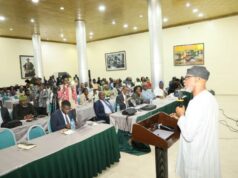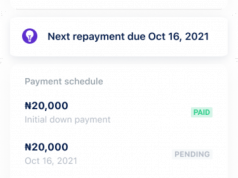THUR, FEBRUARY 2 2017-Today, Heads of State from across Africa endorsed the Addis Declaration on Immunization, also known as the Ministerial Declaration on Universal Access to Immunization, a historic and timely pledge to ensure that everyone in Africa – regardless of who they are or where they live – receives the full benefits of immunization. The endorsement was issued during the 28th African Union (AU) Summit in Addis Ababa, Ethiopia.
While Africa has made impressive gains over the last 15 years toward increasing access to immunization, progress has stagnated, and the continent is falling behind on meeting global immunization targets. One in five children in Africa still does not receive basic life-saving vaccines and, as a result, vaccine-preventable diseases continue to claim too many lives. Measles alone accounts for approximately 61,000 preventable deaths in the African region every year.
“We know that universal access to immunization is achievable,” noted outgoing African Union Commission Chairperson Nkosazana Dlamini-Zuma. “The Addis Declaration on Immunization is a historic pledge. With political support at the highest levels, we are closer than ever to ensuring that all children in Africa have an equal shot at a healthy and productive life.”
The Addis Declaration on Immunization calls for countries to increase political and financial investments in their immunization programmes. It includes 10 commitments, including increasing vaccine-related funding, strengthening supply chains and delivery systems, and making universal access to vaccines a cornerstone of health and development efforts. The full declaration can be found below.
“Vaccines are among the most effective public health tools available,” said Dr Matshidiso Moeti, World Health Organization (WHO) Regional Director for Africa. “When children are given a healthy start, communities thrive and economies grow stronger. This show of support from Heads of State is a significant step forward in our efforts to achieve universal access to immunization and, ultimately, improve child health and drive sustainable development across Africa.”
Fewer than 15 African countries fund more than 50% of their national immunization programmes. As Africa nears polio eradication, critical funding for immunization through the polio eradication programme is expected to ramp down. Additionally, countries approaching middle-income status will transition away from Gavi support for immunization in the coming years. Consequently, governments must redouble their efforts to make universal immunization coverage a national priority.
“As long as even one child in Africa lacks access to immunization, our work remains unfinished,” said Dr Ala Alwan, outgoing WHO Regional Director for the Eastern Mediterranean. “With the right mix of political will, financial resources and technical acumen, Africa can – and will – stem the tide of vaccine-preventable diseases across the continent.”
With strong leadership and investment, increased access to immunization is within reach. For example, in 2010, Ethiopia built 16,000 new health centres, purchased 2,000 battery-free solar refrigerators for vaccine storage, and built a network of millions of health extension workers and volunteers at community level to increase access to immunization throughout the country. Since these investments were made, Ethiopia has made remarkable gains, with immunization rates soaring from 61% in 2010 to 86% in 2015.
“Immunization is one of the smartest investments a country can make in its future,” said H.E. Professor Yifru Berhan Mitke, Ethiopia’s Minister of Health. “We must do more to protect all our children from preventable diseases – not only because it is the right thing to do, but also because it makes economic sense. When our children are healthy, our families, communities and countries thrive.”
The Addis Declaration on Immunization was signed by Ministers of Health and other line ministers at the Ministerial Conference on Immunization in Africa (MCIA) in February 2016 in Addis Ababa. MCIA was the first-ever ministerial-level gathering with a singular focus on ensuring that children across the continent can access life-saving vaccines. To guide the implementation of the ADI, a roadmap is being developed in close collaboration with the WHO offices in the African Region and Eastern Mediterranean Region, the African Union Commission and immunization partners.
“African leaders are showing outstanding leadership by endorsing this landmark commitment which will allow more African children to be reached with life-saving vaccines no matter where they live,” said Dr Ngozi Okonjo-Iweala, Chair of Gavi, the Vaccine Alliance board. “We must now ensure that the commitments translate into sustainable financing for immunization. Gavi stands ready to support African countries in their efforts to implement equitable health approaches and maintain strong immunization coverage so we can create together a more prosperous future for communities across our continent.”-Courtesy African Media Agency (AMA)









